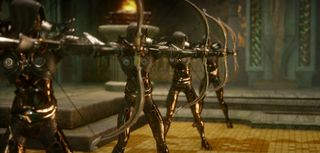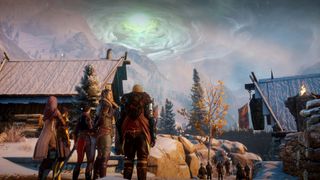The making of Dragon Age: Inquisition

BioWare games often split responsibility for the pacing of the game with the player, and in this case the issue is one of proportion: the game gives the player too little clear instruction about what she is expected to do next, and so she sticks with what she knows. The solution comes from clearer presentation. But the player needs to be free to spoil their experience if the agency they’re given is to have any meaning. The team’s job is to negotiate the right balance rather than force an ‘ideal’ result. “Having ‘investigate’ options can really ruin the pacing of a story,” Gaider says, “so you have to walk the line and try to find the places where it’s appropriate.”
For Inquisition, the Dragon Age team implemented new conversation mechanics for delivering the types of information normally buried in ‘investigate’ trees. Being able to pop up the conversation wheel in the open world allows the player to seek out more information if they want it, or walk away from conversations entirely. It’s up to them, and if it alters the tone of the narrative then the player owns that decision. This, I think, is the flipside of BioWare’s commitment to its social responsibilities: its willingness to ask the player to ‘perform’ the story they’d like to receive, and the thought that goes into building better tools to let them do so.
You always want to give the player a chance to react, in game, to whatever has happened.
This notion is expanded in Inquisition with the introduction of a new set of emotional response options that occur after key events: no longer restricted to being simply happy, angry or sad, the range available to the player includes stoic, puzzled, upset, and so on. “You always want to give the player a chance to react, in game, to whatever has happened,” Gaider says. “To let the player acknowledge it, and to have that be acknowledged by the game.”
“In past games we’ve forced a reaction or shied away from it,” Weekes adds. “Having the reaction wheel allows us to have someone be angry, be sad, or if they’re the player that doesn’t care they can be like ‘THAT SUCKS. MOVING ON.’”

Gaider continues. “We ask the player—do you have any feel... feelings about this? And the player can turn it to ‘sad’.”
“Way to not say ‘feels’,” adds Weekes.
These responses don’t alter much about the narrative beyond the conversation in which they occur, but that’s not the point—the point is to allow the player to feel like they’ve expressed themselves, even if they don’t have any power to change what has happened. It’s an intelligent, realistic way of incorporating an emotional performance as part of a game, delineating ‘the power to change something’ from ‘the power to feel ways about stuff’ in a manner that was less clear in, say, the Mass Effect series.
PC Gamer Newsletter
Sign up to get the best content of the week, and great gaming deals, as picked by the editors.
To my mind, the complaining and petition-signing that followed the downbeat initial ending of Mass Effect represents a failure of a portion of the game’s playerbase to uphold their part of the bargain. Instead of acknowledging BioWare’s power to have bad things happen to good people if it suited the story, many fans claimed the ‘right’ to a happier outcome. I ask the Dragon Age team if they felt that they had the freedom to confront the player with outright tragedy in the same way. Player mages and elves, for example, are all but exempt from the prejudices that follow both of those groups around the world of Thedas.
“Personally, and I can’t speak for the rest of the writers on this, I have got negative feedback on anything I have shipped where I exclude player choice based on the player’s race or background,” Weekes says. “Where I have got a more positive reaction is if I allow a player of any race or background to access bonus content. Unless we were making a game that really wanted to explore what it felt like to be discriminated against, we wanted to avoid creating a situation where most players can do something, but elves can’t. That would be realistic in the world, but we don’t think it’s what players want.”

“We do it sometimes,” Gaider interjects. “Non-humans couldn’t marry Alistair.”
“I see the baseline there as being the big choice you make at the end of Origins,” Weekes says. “The bonus is being Alistair’s queen.”
“There’s a difference between restricting player choice and having the world reflect your decisions,” Gaider says. Nonetheless, there are certainly instances where the Dragon Age team have restricted the player in order to deliver a greater dramatic blow.
“Sheryl can speak to this,” Weekes says. “She killed Hawke’s mom. That felt like something terrible but I’d never start a petition to save Hawke’s mom.”
“We don’t shy away when it feels appropriate,” Chee says.
“It’s a case of walking a fine line between having drama in your story and punching the player just because you can,” Gaider adds. “I don’t know that we always walk that line successfully, but that’s part of the story—you gotta deliver bad news.”
I’m fascinated by the amount of respect and consideration that goes into managing the power dynamic between BioWare and the players of BioWare games. One area where their approach shifted, in this regard, was in the provision of love interests for the player between Dragon Age 2 and Dragon Age: Inquisition. This is another area of contention for fans, something that the most ardent BioWare supporters invest a lot of thought into and something that attracts complaints from a reactionary contingent that believe that the developer is progressive at their expense. In Dragon Age 2, every companion bar Sebastian was available as a potential love interest to both a male and female player character. In Inquisition, companions have more specific sexual preferences and this often ties more closely into their background or outlook on life. The player is more restricted, in some ways, but these restrictions make your relationships more meaningful. I ask Mike Laidlaw about the thought that went into that change.
“I think of the characters in Dragon Age 2 as bisexual,” he says. “I think there’s a tendency to hide bisexuality—it becomes the ‘invisible sexuality’—and I dislike that. When we started out to make Inquisition I looked at reactions to Dragon Age 2 and it felt almost ‘too convenient’, a little unreal. I didn’t want to back away from bisexual or pansexual characters but not everybody is for everybody. That’s not always going to work out.
Joining in 2011, Chris made his start with PC Gamer turning beautiful trees into magazines, first as a writer and later as deputy editor. Once PCG's reluctant MMO champion , his discovery of Dota 2 in 2012 led him to much darker, stranger places. In 2015, Chris became the editor of PC Gamer Pro, overseeing our online coverage of competitive gaming and esports. He left in 2017, and can be now found making games and recording the Crate & Crowbar podcast.
Most Popular


